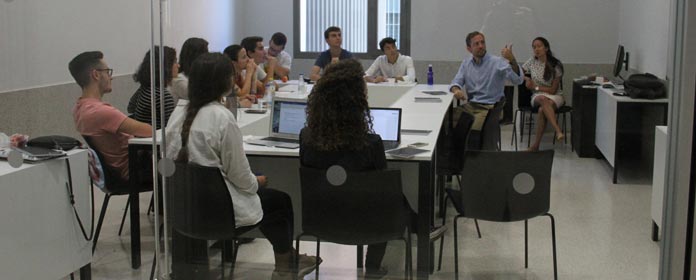Addiction to social networks, the “dictatorship of likes” or the dark side of the web: Students reflect on technology in an ICS initiative
Javier García-Manglano, principal investigator of the Youth in Transition project, leads a series of seminars aimed at students from a variety of majors

FOTO: Isabel Solana
Why do technologies keep us hooked? Do we live in a dictatorship of likes? Are we free in a sea of algorithms that decide for us? Is it possible to avoid misuse on the web?
Since September 28 of this year, a group of students from a variety of majors meets every two weeks to reflect on the influence of technologies in their lives, in their relationships and in society in general. Javier García-Manglano and Charo Sádaba, principal investigators of the Youth in Transition project, organize the initiative at the Institute for Culture and Society (ICS), the humanities and social science research center at the University of Navarra.
"Young people," García-Manglano notes, "teach us a lot about technology. Not just because they are its most avid and innovative users, but also because they reveal, better than anyone else, its positive potential." He adds that, "We are baffled by and scared of the 'new' in technology, but listening to young people we discover that, like us at their age, they ultimately seek to respond to basic human needs like knowing themselves, feeling validated, and belonging to a group, etc."
Claudia López, a psychologist and project collaborator, highlights the need to work with students: "It is important to listen to them, to get to know their concerns and to understand their ambivalent relationship with technology: they are more reflective than we sometimes assume. But first you have to give them the opportunity to express themselves to understand things from their perspective."
Students work in small groups on a topic; they consult bibliography and audiovisual material, they research, and then they moderate discussion with García-Manglano’s help. At the end of the semester, they will also write a paper with their conclusions, concerns, proposals and suggested research lines for the future. The range of topics includes artificial intelligence, the phenomenon of influencers, social networks, addictive design and the polarizing consequences of content personalization.
External speakers and visits to companies and fairsThe organizers also plan to invite external speakers and entrepreneurs working in related sectors and industries, as well asto visit companies and fairs, such as 4 Years from Now (at the Mobile World Congress that takes place every year in Barcelona).
Gabriela Castelló, a junior majoring in Economics, Leadership and Governance, is one of the program participants. She comments that she is excited to attend: "I hope to enter into dialogue, to delve into interesting topics, with people who think differently and know a lot about the challenges that young people face."
She affirms that these challenges include mobile phone addiction, the impact of social networks, problems associated with early exposure to technology... "We have to consider and understand all of this because our world is going in that direction," she acknowledges. “It is our responsibility to decide how we want it to develop."




